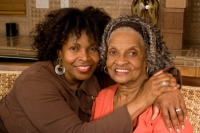In the simplest ways, my grandmother mended my soul.
She was the smartest person I knew. She read at least one book a day. I sat and read with her. She loved mysteries. So did I. She could answer all of the questions on Jeopardy. I thought that an old woman could know everything.
She looked like an old lady. Old ladies knew how to dress then. They had special black, old lady, lace-up shoes, not the running shoes grandmas favor today. Sometimes she let me tie her shoes. In this way, I helped her.
She had beautiful handwriting. Thirty years after her death I can remember her shopping list, composed in her ornate curves: beets, mixed vegetables, cottage cheese. I practiced my letters by following hers.
A widow, she sat at the table in our kitchen on her frequent month-at-a-time visits, smoking Viceroys, reading, and doing the New York Times crossword. She made special meals for us too, chicken fricassee and eggs with paprika, because she was born in Hungary. She made me sandwiches when I got home from school every day: fatty bacon sandwiches on fresh white bread. Food that provided warmth and comfort.
My grandmother was a center of calm.
Then we played two handed canasta and poker. We bet pennies. I learned to lose. And to win.
And she mended: She added the sound of the sewing machine to our household, the hum as her foot pressed the pedal. I watched her steady hands guide the fabric under the arm of the sewing machine, fixing what we had torn.
My grandmother wasn't a woman with ambition, as far as I know. She was quiet. Solitaire was her game. My mother, on the other hand, loved going out and having a good time. My mother was nervous and excitable. She made and lost friends. She spent hours putting on her makeup. Then, as I grew older, my mother searched for herself. She took classes at the New School. She looked for different jobs.
My grandmother with her old fashioned ways, with her handkerchiefs, and her housedresses, and her seat in the kitchen.
We always knew where we could find her.




